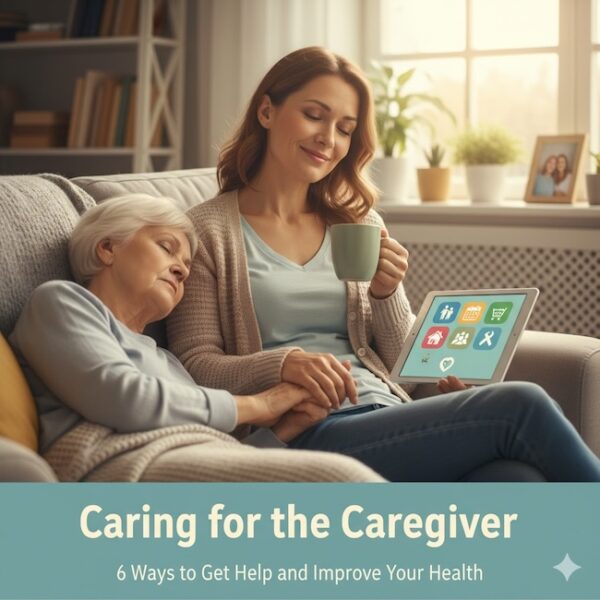Caregiver is a title you never applied for, yet one you fulfill with profound dedication. In the relentless rhythm of prioritizing someone else's needs, it's easy to forget a fundamental truth: the quality of your loved one's care is directly linked to your own well-being.
When your energy is depleted, your patience wears thin, and your health is neglected, the entire care ecosystem suffers. This isn't about adding more to your plate; it's about strategically reinforcing the foundation that everything else depends on – you.

Let's move beyond the cliché of self-care and explore six tangible ways to build a support system that actively protects your health and sustains your ability to care.
Caring for Yourself is an Essential Part of Caregiving
Caring for the caregiver is a key component in long-term caregiving.
Without help, you’re more likely to become exhausted and severely stressed. That can lead to serious health problems and limit your ability to care for others.
This is why it’s so important to find caregiving help so you can take regular breaks and have the time to maintain or improve your own health.
It might take a little work to build the network of support you need, but the positive impact on your health and well-being makes it worth it in the long run.
It helps to be flexible and combine help from family, friends, hired caregivers, paid services, and volunteers to get the caregiving help that you need at prices you can afford.
We share 6 ways to get help with caregiving so you’ll have the time you need to take those well-deserved breaks to rest, recharge, and keep going.
6 Ways to Get Help with Caregiving So You Can Take Breaks
1. Ask family and close friends
Sometimes, family or friends don’t know where to start or what they could do. Others might feel that you don’t want or need any help.
And some people don’t realize how much time, energy, and sacrifice caregiving really takes.
To get more help from family or friends, have calm, open one-on-one conversations and let them know that you need their assistance.
Make it easier for them to help by asking them to do things that play to their strengths, like running errands, light housekeeping, simple home repairs, and online research.
If you need help with hands-on caregiving, ease someone into it by having them shadow you, learn, and get comfortable for a little while before asking them to do it on their own.
2. Hire help for non-caregiving tasks
Being a caregiver involves much more than just caring for the person themselves.
Their living environment and essential supplies also must be maintained.
Getting help with non-caregiving tasks takes those tasks off your to-do list and gives you more time for yourself.
That could include hiring someone to buy groceries and household supplies, getting help with laundry, hiring a housekeeper, purchasing a meal service for part of the week, hiring a gardener, having a handyman come once a month, etc.
3. Hire an in-home caregiver
As your older adult’s care needs increase, they’ll need more help with activities of daily living, such as eating, bathing, dressing, and moving around.
These activities can consume your days and nights, leaving you exhausted.
Hiring an in-home caregiver will give you some much-needed help so you can take regular breaks.
Having in-home caregiving help is especially important if your older adult isn’t sleeping well and you’re not getting enough rest at night.
Having someone take over a few nights a week or getting longer naps during the day will make a big difference in your health and quality of life.
4. Enroll in an adult day program
Adult day programs are places where seniors can go during the day for care, nutritious meals, and engaging social activities.
Adult Day Programs also give you much-needed breaks to reduce stress and prevent burnout.
In addition, older adults often benefit from the added social interaction, and the cost is much lower than hiring an in-home caregiver.
Many Adult Day Programs even offer transportation services to shuttle seniors to and from home.
5. Use respite care
Respite care is another way to get a much-needed break from caregiving and protect yourself from being overwhelmed by caregiver stress and burnout.
It can also help you keep your older adult at home longer by giving you the breaks you need to keep going in the long term.
Respite care is typically a paid service offered by for-profit companies, but some state and non-profit organizations also provide free or low-cost respite programs for seniors who qualify – Alzheimer’s Association and Alzheimer's Foundation of America, Veterans Administration, and National Family Caregiver Support Respite.
6. Find local volunteer programs
Many cities and counties also have local volunteer programs or service organizations that provide help or companionship for seniors.
Any help you can get will give you a little more time for yourself.
Contact your local Area Agency on Aging and ask them to connect you with volunteer services or organizations that could help with caregiving.
Final Thoughts
Remember, seeking help is not an admission of failure, but a strategic masterstroke in sustainable caregiving. Each of these six ways is a thread you can use to weave a stronger safety net—for your loved one and, most critically, for yourself.
You are not a bottomless resource; you are a human being who deserves care, support, and respite. Start by choosing just one of these pathways—whether it's delegating a single task or scheduling a medical appointment for yourself. This is how you begin to transform your journey from solitary endurance to supported strength. You cannot pour from an empty cup; filling yours is the most responsible and caring thing you can do.
Recommended for you:
- Affordable Home Care: 8 Ways to Lower Senior Care Costs
- 6 Ways to Make It Easier for Caregivers to Take a Break
- Caregiver Guilt: Don’t Let Two Common Myths Increase Stress
A version of this article was originally published on Sixty and Me. This article wasn’t sponsored and doesn’t contain affiliate links. For more information, see How We Make Money.
About the Author

Connie is the founder of DailyCaring.com and was a hands-on caregiver for her grandmother for 20 years. (Grandma made it to 101 years old!) She knows how challenging, overwhelming, and all-consuming caring for an older adult can be. She also understands the importance of support, especially in the form of practical solutions, valuable resources, and self-care tips.













